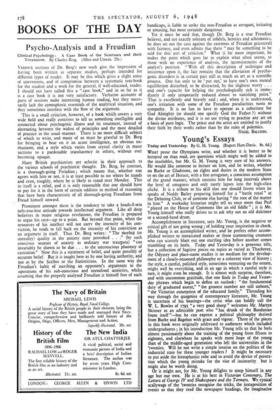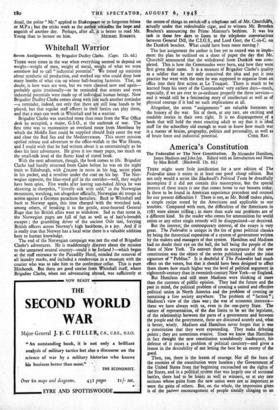Young's Essays ,
Today and Yesterday. By G. M. Young. (Rupert Hart-Davis. 8s. 6d.)
WHAT prose the Olympians write, and whether it is better to be lectured on than read, are questions which might well be added to the insolubles, but Mr. G. M. Young is very sure of his answers. He would like someone to lecture on him, and he writes, whether On Burke or Gladstone, on rights and duties in the modern State or on the art of. Horace, with a fine arrogance, a conscious assumption of the grand manner, which sustains him for long intervals above the level of smugness and only rarely lapses into the high-class cliché. It is a tribute to his skill that one should frown when he speaks of Neddy Bailey preparing himself for a " battle royal" at the Debating Club, or of someone else having " the root of the matter in him." A workaday historian might tell us once more that Peel " played on the House of Commons like an old fiddle " ; it is Mr. Young.himself who really drives us to ask why not an old dulcimer or a second-hand drum.
Accomplishment in literature, says Mr. Young, is the negative or critical gift of not going wrong ; of holding your inspiration in check. Mr. Young is an accomplished writer, and he prefers other accom- plished writers to intoxicated zealots or those stammering creatures who can scarcely blurt out one startling idea before another comes stumbling on its heels. Today and Yesterday is a generous title, but a collection of fugitive pieces on topics as varied as Thackeray, the Odyssey and place-name studies is no medium for the develop- ment of a closely-reasoned philosophy or a coherent view of history ; the style, a careful, polished style, sometimes venturing on the ornate, might well be everything, and in an age in which a careful style is rare, it might even be enough. It is almost with surprise, therefore, and with uncommon gratitude, that one finds in Today and Yester- day phrases which begin to define an outlook : " the fundamental duty of graduated assent," " the greatest number are still unborn," " the Victorian conception of the educated family." Threading his way through the quagmire of contemporary literature, Mr. Young is uncertain of his bearings—the critic who can boldly call the W. L. Bowles of 1793 "a very good sheep" welcomes Mr. Martyn Skinner as an admirable poet who " has drunk of the Bandusian fount itself "—but he can express a political philosophy derived from Burke and Bagehot with grace and vigour. Three of the pieces in this book were originally addressed to audiences which included undergraduates ; in his introduction Mr. Young tells us that he feels almost passionately about the training of the young from fifteen to eighteen, and elsewhere he speaks with more' hope of the young than of the middle-aged generation who left the universities in the 'twenties. Will he not write a simple treatise on the politics of the industrial state for these younger readers ? It might be necessary to put aside the hierophantic robe and to avoid the device of perora- tion which the young mistake for the vice of insincerity , but it might also be worth doing. Or it might not, for Mr. Young delights to steep himself in any age but our own. He is at his best in Victorian Centenary, The Letters of George IV and Shakespeare and the Terrners. We cynical scallywags of the 'twenties recognise the tricks, the juxtaposition of events so that they read hie newspaper headings, the imaginative
detail, the polite " Mr." applied to Shakespeare or to forgotten felons or M.P.s ; but the tricks work as the author rekindles the hope and anguish of another day. Perhaps, after all, it is better to read Mr.



































 Previous page
Previous page